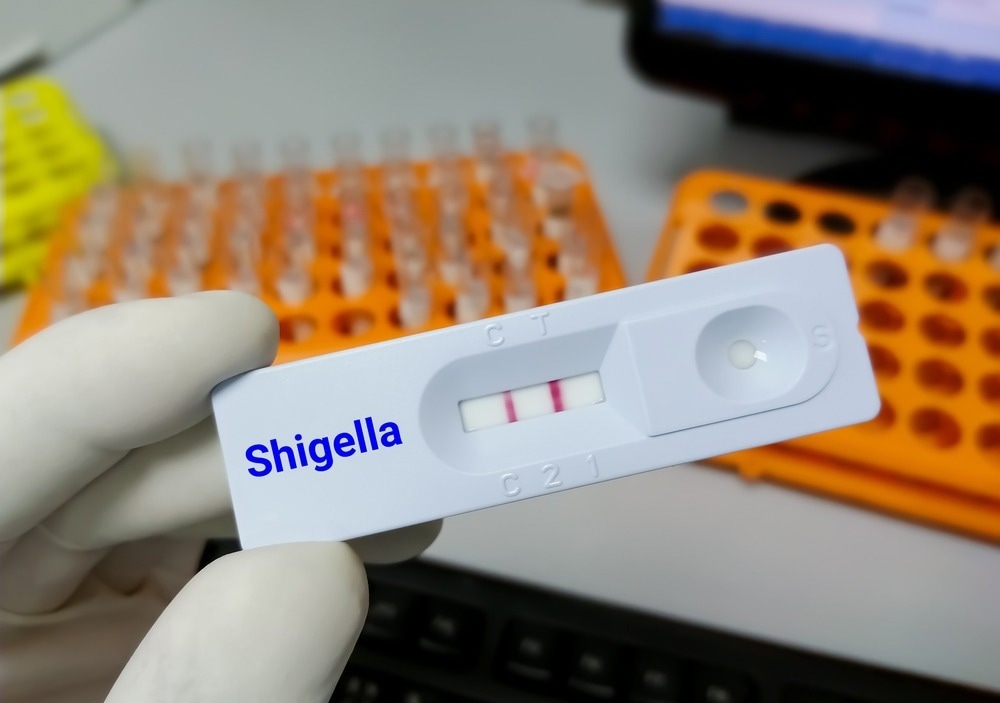Shigella bacteria, which causes Shigellosis, is the primary cause of bacterial diarrhea and diarrheal death among juveniles under five years of age. Because of the antibiotic resistance of Shigella strains, no commercial vaccines are available to date.

Study: Stable Recombinant Invasion Plasmid Antigen C (IpaC)-Based Single Dose Nanovaccine for Shigellosis. Image Credit: Saiful52/Shutterstock.com
An article published in Molecular Pharmaceutics presented an extension of a previous work that demonstrated the stabilization of “invasion plasmid antigen C” (IpaC) protein by using Shigella dysenteriae serotype 1 (Sd1)-based recombinant to induce immune responses in BALB/c mice. However, this work involved the administration of three intranasal doses of IpaC without an adjuvant.
The aim of this study was to increase patient compliance by reducing the dosing frequency. Based on previous screening results, the optimal protective dose of stabilized IpaC, 20 micrograms was encapsulated in biodegradable polymeric poly(lactide-co-glycolide) (PLGA) nanoparticles with approximately 370 nanometers in size and a single-dose nanovaccine was administered intranasally into BALB/c mice.
The results revealed a temporal increase in antibody production with improved cytokine response via nanovaccine administration compared to free IpaC, which was administered three times in a previous study. The vaccinated animals were protected from diarrhea, lethargy, and weight loss upon intraperitoneal challenge with a high dose of heterologous Shigella flexneri 2a, whereas all the control animals died within 36 hours after the challenge.
Overall, the created nanovaccine could be investigated as a potential non-invasive, cross-protective, single-dose, single-antigen Shigella vaccine that is scalable and eventually suitable for mass vaccination.
Shigellosis and Development of Nanovaccine
Shigellosis is an intestinal infection caused by Shigella bacteria. Symptoms generally start one to two days after exposure and include diarrhea, fever, abdominal pain, and the need to pass stools, even when the bowels are empty.
Most Shigella strains develop resistance to many antibiotics. Since an approved vaccine is still unavailable, formulating an effective Shigella vaccine candidate has been declared a public health priority by the World Health Organization (WHO).
Nanotechnology plays a unique role in vaccine design by providing them with enhanced specificity and potency. Nanoparticles of less than 500 nanometers are quickly taken up by antigens and hence serve as potential carriers for delivering vaccine antigens and adjuvants. Nanoparticles have advantages, such as improved antigen stability, targeted delivery, and long-term release, for which antigens/adjuvants are either encapsulated within or decorated on the surface of a nanoparticle.
Nanovaccine exhibits unique physicochemical characteristics. The role of a nanovaccine as a potent vaccine has been examined to boost their therapeutic activity by enhancing their stability, prolonging their circulation and site-specific accumulation, increasing their delivery according to various biological and external stimuli, and overcoming physiological barriers.
As an active immunogenic material that modulates the immune response, a nanovaccine enables antigen stability, enhances antigen processing and immunogenicity with targeted delivery, and prevents the burst release of antigens and adjuvants.
IpaC-Based Single Dose Nanovaccine for Shigellosis
Although there has been a great deal of effort to develop a Shigella vaccine that is both safe and effective, none has been clinically approved. Although conserved recombinant subunit vaccines can be cross-protective in nature, adjuvants are required to provide sufficient immunogenicity, which may present safety issues.
Furthermore, the administration of multiple doses of subunit proteins along with adjuvants in previous studies did not result in sufficient immunogenicity and effective cross-protection. Previously, a self-adjuvant vaccine was created by stabilizing IpaC, an unstable conserved recombinant Shigella protein. Three intranasal doses of stabilized Shigella dysenteriae IpaC resulted in 100% survival when challenged with heterologous Shigella flexneri.
The present study was a step toward extending the shelf life of stabilized IpaC and lowering the dose frequency to boost patient compliance. Here, a previously determined minimum protective dose, 20 micrograms of IpaC, was administered intranasally as a single dose nanovaccine, wherein a biodegradable PLGA polymer was used to formulate the nanovaccine.
Additionally, because PLGA shows adjuvant properties owing to the depot effect, it avoids the need for an additional adjuvant. Thus, utilizing PLGA nanoparticles to deliver Shigella proteins helps to develop a minimalist single-antigen nanovaccine against Shigella.
The developed PLGA 50:50 nanoparticles released up to 77% of the encapsulated protein in 28 days at 37 degrees Celsius and were degraded in 35 days under physiological conditions. Following the administration of the nanovaccine, the nanoparticles were lyophilized effectively and transported, which was desirable for translatable vaccines.
Furthermore, IgG and IgA titers increased with time, indicating sustained release of IpaC from the nanovaccine. Ultimately, the single-dose nanovaccine encapsulating 20 micrograms of stabilized IpaC showed potential as a non-invasive, single-antigen nanovaccine against Shigella.
Conclusion
Overall, the present work provided evidence that encapsulating a minimum protective dose of stabilized S. dysenteriae IpaC protein in PLGA 50:50 nanoparticles results in a non-invasive, single-dose, single-antigen, cross-protective Shigella nanovaccine with scope for mass scale-up and immunization.
Reference
Baruah, N., Halder, P., Koley, H., Katti, D.S. (2022) Stable Recombinant Invasion Plasmid Antigen C (IpaC)-Based Single Dose Nanovaccine for Shigellosis. Molecular Pharmaceutics. https://pubs.acs.org/doi/10.1021/acs.molpharmaceut.2c00378
Disclaimer: The views expressed here are those of the author expressed in their private capacity and do not necessarily represent the views of AZoM.com Limited T/A AZoNetwork the owner and operator of this website. This disclaimer forms part of the Terms and conditions of use of this website.